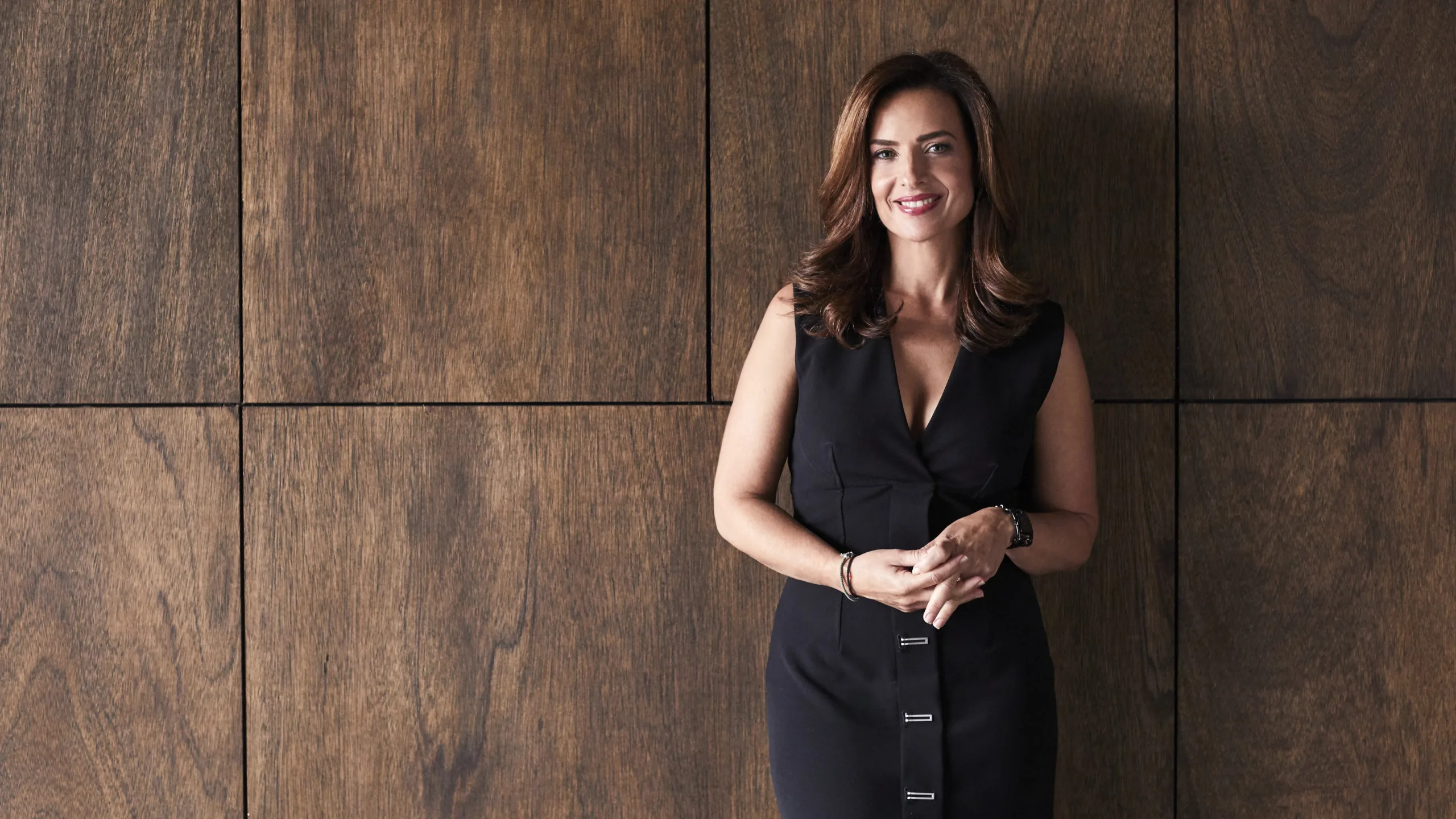When many hear the name Helen Kapalos, they are instantly taken back to a young journalist from Newcastle in New South Wales making waves at national news channels like Channel Nine and Channel Ten.
Fast forward to today and Helen has come a long way since then. She has defied media industry norms, advocated for medicinal cannabis use, and is a champion of multiculturalism. In September 2024, she is also heading to Ioannina, Greece for the first global conference ‘Women and Hellenism’ where she will share her experience as a woman in media with hundreds of other Greek women from across Australia and the world.
Ahead of the conference, The Greek Herald sat down with Helen to hear all about what she’s been up to recently.
Tell us a little bit about yourself and your Greek heritage.
I was born and raised in Newcastle, NSW to Greek parents. My mother Ioanna was a dressmaker, and my dad Dimitrios was a tailor, and ran a little Greek café in Newcastle. I always had the strong impression growing up that my parents embraced the opportunities that came with migration, particularly the pathways to higher education. Incidentally, I didn’t learn English until I was 5. Dad used to affectionately refer to me and my siblings as “Greek Kangaroos”.
My sister Maria is a scientist, and my brother Stratos is a builder. As you can see, we had very conspicuous Greek names and from an early age, I can remember being very proud of my heritage and exclaiming to my parents that I would never change my name, even if I got married! My mother passed away 30 years ago this year and my dad moved to Greece shortly after her death, where he continues to live. He is based in Nea Triglia, a village on the first leg of Chalkidiki, near Kassandra. He’s 87 now and we feel so lucky to have him and cherish the moments we have with him when we visit our homeland.
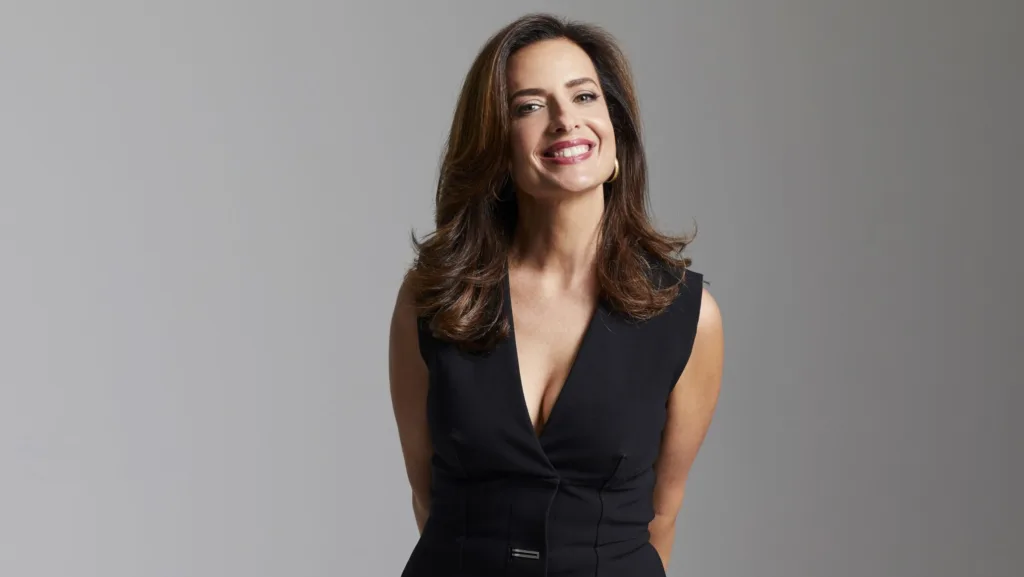
You are a well-known Australian broadcaster who has worked across the commercial and public broadcasting sectors. Did your Greek heritage make it difficult to get roles in this industry in the early days?
At first, I didn’t think so, but I did encounter some issues in commercial TV when a news boss requested that I consider changing my name from Kapalos to Smith. Of course I was never going to agree to that, but I do recall friends and relatives being concerned it would impact my career. I never let it become a problem (for me, anyway) and when the 2004 Olympics came around, I was ready and prepared to report from the Greek capital, even if it meant quitting my job at Channel Nine. I was that determined!
I took leave and travelled to Athens earlier that year, just in time to see the Greeks win the European Cup. As it turned out, the gods were on my side and when they won, I was on the spot and funded several stories on my own using amazingly talented Greek editors and production companies. I ended up being able to broadcast those stories back to Channel 9, from National Nine News to the Today Show.
Thankfully the strategy to take some initiative paid off, as not many women were given overseas postings, and my prospects were not looking good, but I do believe we can create our own destiny. I can remember when I was given the gig at the Athens games it ruffled a few feathers in the Channel 9 newsroom at the time, but ultimately it proved a gateway for other young females aspiring to do the same. It just wasn’t being done often enough at that time. I was incredibly determined to be there as I travelled to Greece so often and felt I could add value and insights into the coverage, particularly since the Greeks were being criticised for delays and cost blow outs… I thought I could add some perspective and tell a fuller story.
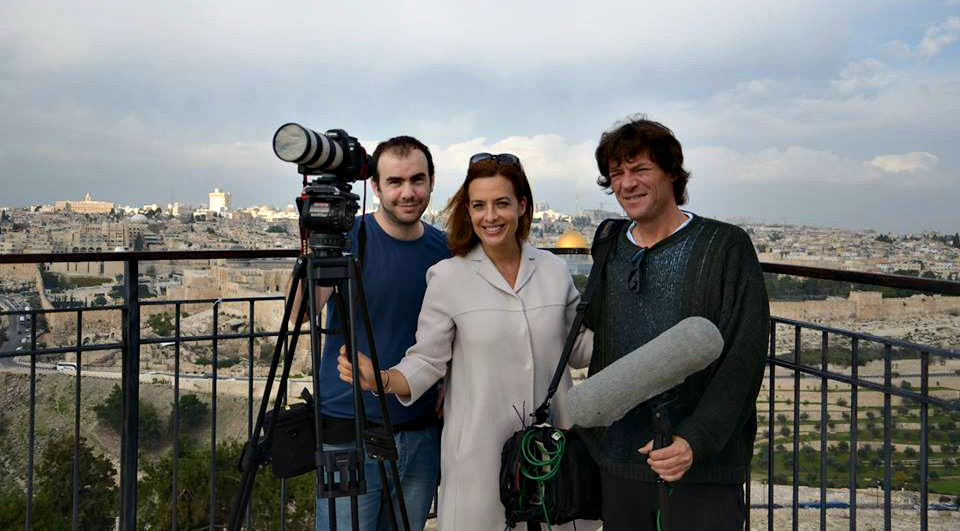
You’ve previously spoken about your ‘undignified’ sacking from Channel Ten. Looking back, what are your thoughts on that period in your life? What was the response from the Greek community in Australia?
The response was incredibly humbling and for me, very moving. You never really know if you are having an impact, and I can remember feeling I wasn’t alone. The Greek community rallied around me, that’s for sure and I was so, so grateful for that, more than anyone will ever know and more than I can really express here. The general community were also supportive, and I did feel at that time that it wasn’t just about me being sacked from a news program. It was about the way people are treated in workplaces. I still don’t understand why sackings are carried out this way. What did they think I would do? Run away with the loot!
I think everything in life is about the way we react and when I was told, and the way I was told, I honestly wanted to walk out of that building and never walk back into it again. I remember saying to friends at the time, ‘seven times fall, eight times get up,’ a Japanese proverb I loved, and that rang true for me. I knew I would survive, but I also knew maybe its time to do something else. Looking back, I see the blessings. It signalled a new era for me and reminded me there is a big world out there with infinite possibilities. It’s not easy to see it when you are in the eye of the storm, but it really did fortify me for everything that came down the track and new pathways that I never could have foreseen that brought me a lot of joy and purpose.
You’ve since moved on to bigger things including creating a documentary ‘A Life of its Own,’ detailing Australia’s medicinal cannabis debate. It was also distributed globally by Netflix. How did you become involved in this documentary?
The documentary really found me I believe. I was doing a story on the topic of medicinal cannabis for a program on Channel 7, called Sunday. I thought the story would be fairly straightforward following a young man’s journey with cancer, who was using medicinal cannabis to help ameliorate the symptoms associated with his chemotherapy. However, it turned out that he was also using medicinal cannabis to treat his cancer and behind him were the stories of so many Australian families who were using cannabis-based products to help with chronic conditions, especially for young kids with intractable epilepsy. I was absolutely astounded at the scale of the story and our ratings were indicative of the fact that many Australians were invested in the topic, responding quite positively.
However, the story ended up becoming quite sensational so in the end, I ended up leaving the network and asked my bosses for permission to have the rights of the story. They agreed and although I had no idea at the time, I went straight into producing, writing and directing a full-length documentary feature. I used my mortgage to fund it and believe it’s one of the most important stories I have ever told.
The topic of ‘medicinal cannabis’ would be quite taboo in the Greek community and more broadly, Australia. How did you tackle this?
Through mirroring back to ordinary folk how this story impacts all of us. Fundamentally, this is a story about human rights, and the right to have all the healthcare options that are available to all of us. Medicinal cannabis is one of those options. Our body responds to the plant through the endocannabinoid system. It’s as simple as that. I think Greeks have been and are forward thinkers and I have been pleasantly surprised at how open many people from Greek backgrounds have been about the topic.
Of course, nothing is more fascinating than testing the opinions of your immediate family. A few years ago in the village, I bought all my aunties and dad over-the-counter CBD oil, which is available in Greece. They mocked me initially, but once they ingested the oil, their whole disposition changed. CBD is quite calming and an anti-inflammatory. I think time, and the acceptance of the medical community, will make all the difference, as stigma continues to be a real barrier in perceptions all over the world, but change is coming. I really believe that.
You also play a significant role in the multicultural sphere, serving as Victoria’s Commissioner for Multiculturalism for four years and Swinburne University’s first Vice-Chancellor Fellow for Multicultural Engagement. How did make the switch from mainstream media to multicultural advocacy?
The role at the Victorian Multicultural Commission was a wonderful surprise to me and emerged as an opportunity after I was asked to emcee the Premier’s Gala Dinner, an event which celebrates cultural diversity. I remember speaking quite candidly about the way I had reconciled my Greek and Australian identities and how much strength both had brought me.
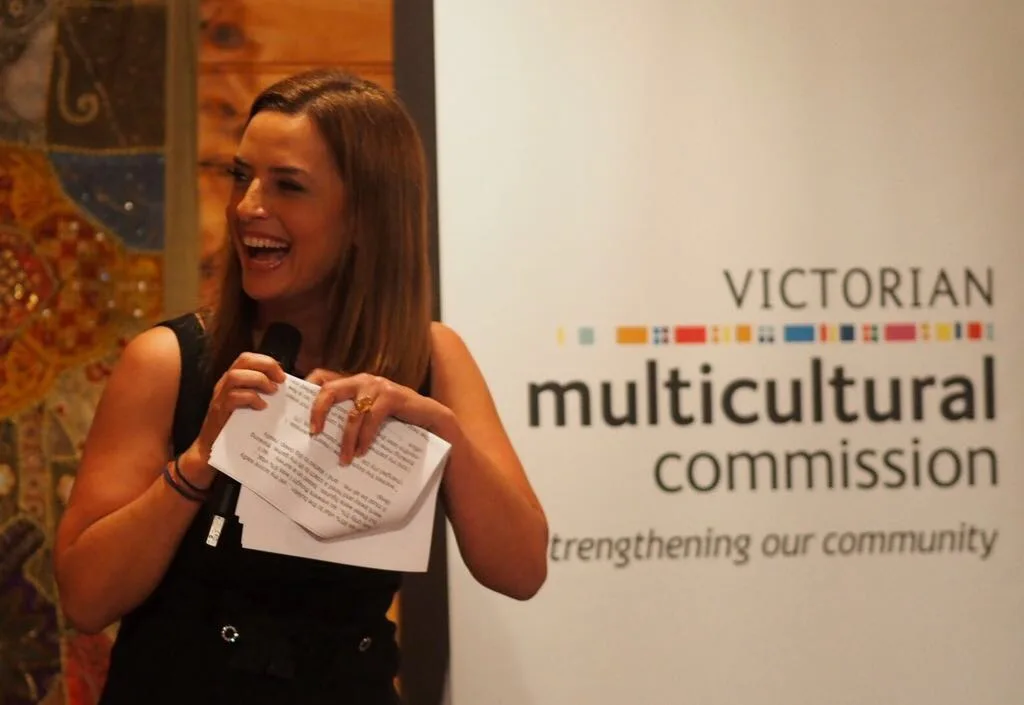
The Chair position was an extraordinary role, where I witnessed the gift of diversity up close and personal. Although I had experience in my reporting days on issues that impacted cultural diverse communities, this role exposed many of the real barriers these communities faced, and I tried to encounter many of them in a practical way, such as designing the internship in partnership with ABC to fund internships for youth from disadvantaged and marginalised backgrounds, and also creating the Multicultural Film Festival with Swinburne University, which continues today.
I found the switch to government very rewarding and illuminating. Understanding the machinery of government has served me for future roles and I was very fortunate that during that term I was able to work with some excellent public servants to help shape social policy and champion better outcomes for CALD communities, which remains a critical priority. Stigma also plagues communities from CALD backgrounds and cultural biases come into play in the corporate landscape and in every sphere of society. Some of the best work in this area comes from initiatives that address affinity bias, which is our propensity as human beings to gather with those we think resemble or reflect our own cohort, for safety. It’s a fascinating policy area and so fulfilling. I feel this role changed me in ways I couldn’t imagine. It showed me that reaching the hard-to-reach areas of policy was where the magic lay.
Do you think there’s a future for multiculturalism in Australia where both established and emerging communities can be equally respected by society, as well as state and federal governments?
Yes, I do see that very much being a possibility on the horizon. There’s great work being undertaken at both a state and federal level and established and emerging communities are captured in those policy arenas. The way we integrate new and emerging societies is important.
Holistic settlement is necessary for successful long-term outcomes. Established communities are key to assisting the newer communities with successful strategy implementation.
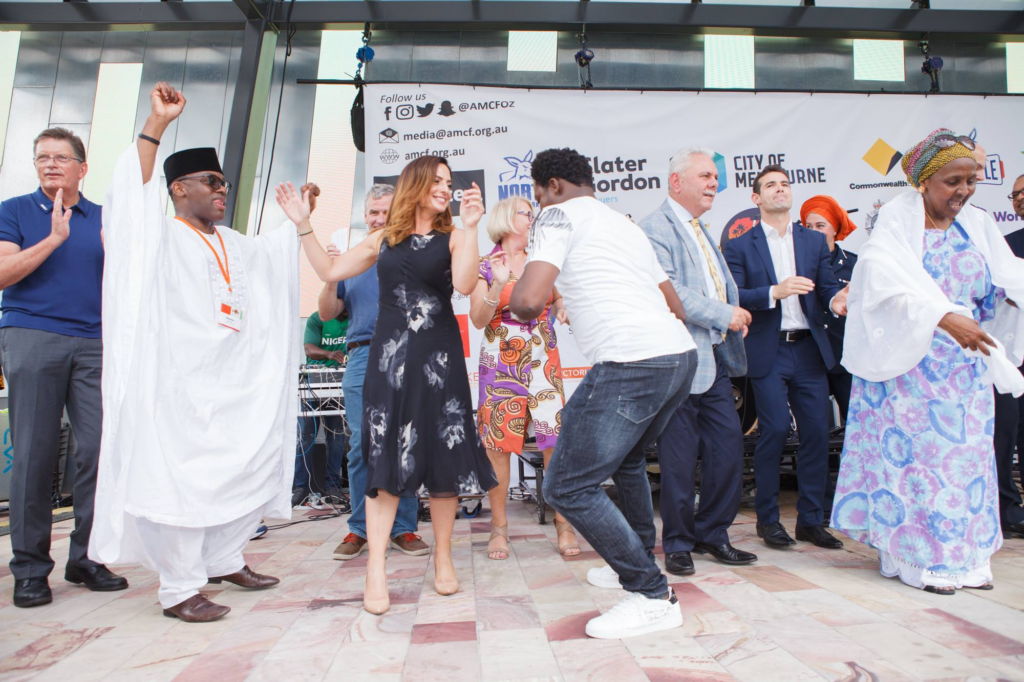
This year you are also taking part in the Greek Women and Friends Global Forum in Ioannina, Greece. Why did you decide to take part in the forum?
I knew right from the start it would be a wonderful event to be part of. Varvara brings so many good people together and is focused on storytelling to cut through to audiences. She’s an extraordinary woman. As soon as I heard about the event, I submitted an abstract, keen to share my experiences as a CALD woman breaking into a mainstream media platform and what it took to get there and stay there, using my ancestral strength to keep me fortified at every step.
Your topic of discussion at the forum will be ‘Navigating Identity and Inclusion, From Mainstream Media to Multicultural Advocacy: A Greek-Australian Journey.’ What can people expect from this talk?
I will be sharing some personal experiences from my journey, both from the media world and multicultural sector. People can expect an honest assessment of what challenge and opportunity looks like… sometimes the setbacks are disguised as opportunities to do better and break into a better version of yourself, and sometimes it’s about how you handled yourself during those challenges. It’s never a dead end, and for me, drawing from my ancestral strength has been essential and the ultimate breakthrough. I’ll be sharing that journey with the audience, and I am so looking forward to it!
Registrations continue for the first global conference ‘Women and Hellenism‘ until August 20. For more information and the FULL PROGRAM visit the website of the Food for Thought Network of Hellenic Women in Australia: www.fftn.org.au. Media Contact in Greece: +306936290145. Media Contact in Australia: +61406011015.
The conference is under the auspices of the Greek Ministry of Foreign Affairs, Ministry of Family and Social Cohesion, Region of Epirus, Municipality of Ioannina, Chamber of Ioannina, and the Office of Education of Epirus.
